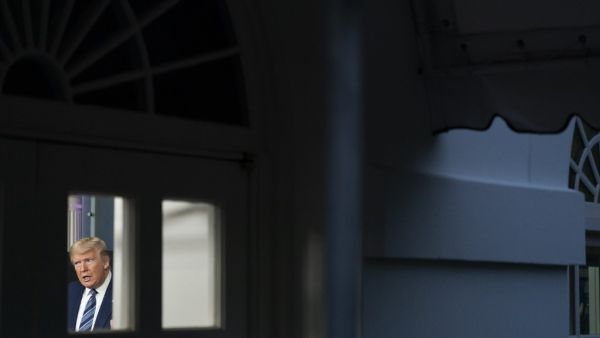President Trump said he could slap 'very substantial tariffs' on oil imports if prices stay low, but doesn't expect to as neither Saudi Arabia nor Russia - which are battling in an oil price war – would benefit.
Oil prices have dropped by about two-thirds this year as the COVID-19 pandemic caused by the new coronavirus has hammered demand and as major producers Russia and Saudi Arabia boost output in a war over market share.
When asked at a White House press briefing Sunday under what conditions he would impose the levies, Trump said, 'If the oil price stays the way it is...I would do that, yeah, very substantial tariffs.'
He previously said he expects Saudi Arabia and Russia to make a deal to cut output by up to 15 million barrels per day.
Neither country has confirmed his comments, but Trump expects tariffs can be avoided.
'I would use tariffs if I had to,' Trump said. 'But I don´t think I'm going to have to, because Russia doesn't benefit by having this and Saudi Arabia doesn't benefit by having this. Oil and gas are their major sources of income so it's obviously very bad for them.'
Russia and Saudi Arabia became embroiled in an oil war after Russia suddenly pulled out of an agreement with Saudi Arabia to limit oil production
Experts said the oil war may strain the relationship between the two countries.
A virtual meeting scheduled between President Vladimir Putin and Crown Prince Mohammed bin Salman to discuss a deal on production cuts is 'likely' to be held on Thursday.
The United States in recent years has become the world's biggest oil producer, at times putting its exports in competition with Russia and members of the Organization of the Petroleum Exporting Countries, or OPEC.
As oil prices drop, many heavily leveraged U.S. energy companies face bankruptcies and workers are at risk of layoffs.
While Trump noted the low oil prices buoyed the battered airline industry and helped consumers, he reiterated his support for the oil sector.
'We have to save a great industry,' he said.
The American Petroleum Institute and other energy interests have told Trump they oppose tariffs, fearing the measures would add costs to importing crude and materials for refineries.
Last month, Saudi Arabia slashed its oil export prices over the weekend and declared a price war with Russia that sent global markets reeling and marked the sharpest decline in oil futures since 1991.
The price drop came after Russia refused to sign on with a proposal by the Organization of the Petroleum Exporting Countries (OPEC) to cut production globally as the coronavirus outbreak has slowed the demand for oil.
OPEC nations met with allies like Russia on Thursday and Friday in Vienna to reduce oil production by an additional 1.5million barrels per day to stabilize the market starting in April through the end of the year.
But Russia refused to join to agreement.
From Russia's perspective cutting production would boost US oil producers at the expense of international competitors and lead to a loss in profits.
The failed talks marked the first break in a three-year alliance between Saudi Arabia led by Crown Prince Mohammed bin Salman and Russia's President Vladimir Putin.
The alliance was key to competing with a surge in American oil production that turned the US into a major crude exporter for the first time in decades.
In response to the price cut Russia said its companies were free to pump as much as they could, as per Bloomberg.
Last week, stocks rose after oil surged more than 30 percent immediately after President Donald Trump said he expects Saudi Arabia and Russia to back away from their price war.
The U.S. is a major producer of oil, and hundreds of thousands of American jobs depend on a Saudi-Russian deal to cut production and send oil prices back up.
'The market already knew that job losses recently have been historic and tremendous,' said Russell Price, chief economist at Ameriprise Financial Services Inc in Troy, Michigan.
'We are coming to terms with just how significant this is going to be. The data will be very bad before it gets much worse in April and May, before we start seeing improvements.'
This article has been adapted from its original source.








